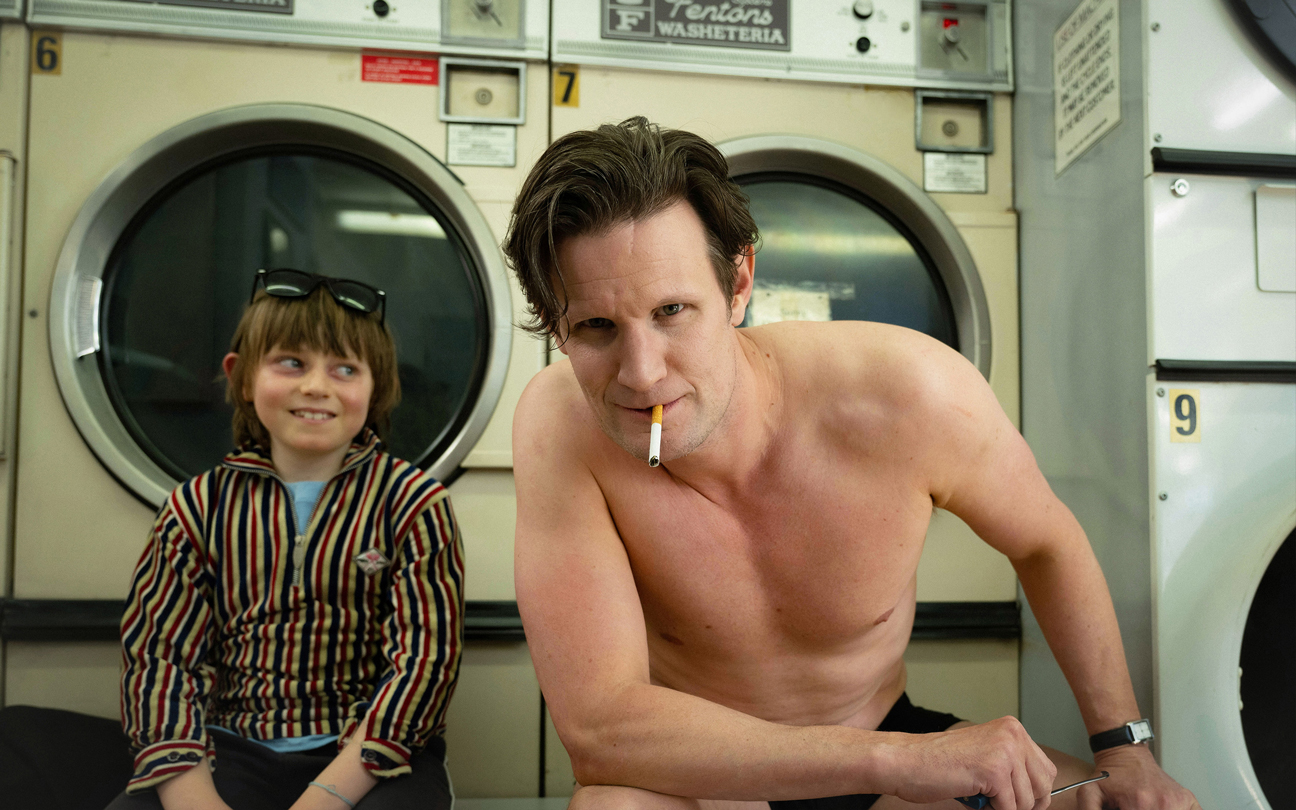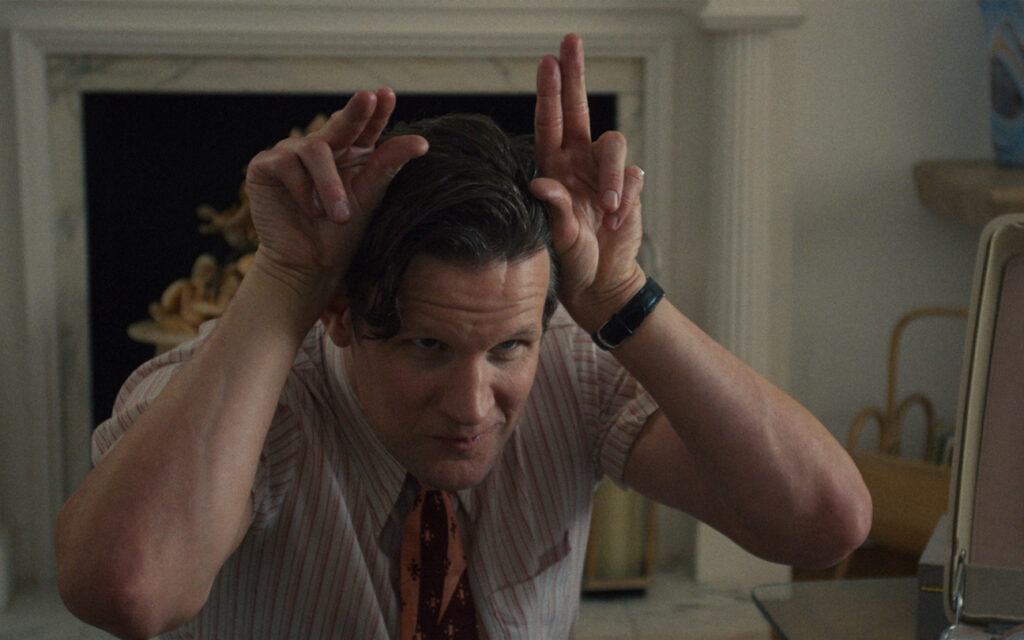Matt Smith and Nick Cave tell us about ‘The Death of Bunny Munro’: ‘It was a wonderful challenge’
Actor Matt Smith and musician and writer Nick Cave discuss Smith’s lead role as a sex-obsessed salesman in the Sky adaptation of Cave’s novel 'The Death of Bunny Munro'
By Nick Reilly

A charismatic Time Lord with two hearts. Charles Manson. A dragon-riding prince fashioned from the brilliant mind of George RR Martin. The roles played by Matt Smith throughout his career are the mark of an actor who is every bit as eclectic as heis hard to pigeonhole.
There’s no risk of that variety ending with his latest role, either, as the eponymous lead in Sky’s adaptation of Nick Cave’s 2009 novel The Death of Bunny Munro. Smith’s character is a sex-addled cosmetics salesman who goes on a road trip with his son after his wife takes her own life, sending him into a wild spiral of chaos. It’s as pitch black and morally conflicted as you’d expect from a character created in the mind of Nick Cave and you’ll seldom be able to take your eyes off the screen. A wank at a funeral. A ceremonial piss across the bathroom of a customer who has wronged our hero. It’s frequently challenging and mad stuff, especially as Bunny’s young son wakes up to the realisation that his heroic father might not be the man he thought he was.
But for all Bunny’s flaws, Cave admits: “There are malevolent people in the world and people that just have a screw loose and they enjoy inflicting misery on the world. I don’t think that is Bunny Munro.”
It’s this central premise which informs an intriguing and often unforgettable adaptation of Cave’s work. We caught up with both men to discuss the project.
Matt, I wanted to ask about your relationship with Nick’s music and whether you’d interacted with the man himself before taking on this project?
Nick Cave: What a fucking horrible question! “Oh, I hated his music!”
Matt Smith: No, I loved his music and I felt it was woven into the fabric of society. I was very familiar with all of Nick’s music and so when I got the call of, “Would you like to go for breakfast with Nick Cave?” it was like, “Fuck, yeah!” And then I read the script, which I really loved. I remember at the end of the meeting you looked at me and said, “So, are you gonna do it?” and I’m so thrilled I did.
And for you, Nick, why was Matt your perfect Bunny Munro?
Cave: I was really excited by the fact that Matt was kind of hot and really different from the Bunny Munro I had in my head, which was an out-of-shape, incompetent lothario type that everyone just thought was a bit of a joke, right? Apart from Matt’s acting roles, the idea that Bunny Munro would be attractive and that when he came onto a girl, the girls like him, that added an extra layer of transgression to the whole that made it even more problematic. So, I was really excited about that idea that Bunny Munro was actually weirdly good at what he wanted to do, which was to seduce women.
Nick Cave thinks you’re attractive, Matt, what do you make of that?!
Cave: No, not attractive. Hot, man! Fire emoji, frankly!
Smith: I’ll take it!

Nick, this is a book that deals quite frankly with fathers and sons and how great losses affect your life. You wrote it in 2009, and I wondered if your own well documented and intense experiences of dealing with loss in the intervening years have changed your relationship with the book?
Cave: Well, I think the portrayal of a grieving man in the TV series is great. The complexity, the absolute chaos of grief is beautifully done. It’s not like that in the book and I hadn’t really experienced anything like that. To see that happening on the screen was really moving to me, and I suspect that Pete Jackson [writer] brought a lot of himself to the script.
There’s an authenticity to it, and the idea of raising a child when you’re not in, let’s say, showroom condition, is something I understand personally. The idea of having this world existing that the child doesn’t know about that’s just horrendous, self-interested, an aberrant world and keeping your child buoyed up and entertained and presenting yourself as the best dad in the world, whereas actually there’s this sort of darkness that’s happening, is something I understand fundamentally.
That is the heartbeat of the Bunny Munro story and this TV series. The beautiful idea that we all know what Bunny Munro is like, but his kid thinks he’s the best dad in the world, is an incredibly moving thing for me to watch. The slow dismantling of his regard for his father is a really deeply moving thing to watch. You can see it on his face where he’s eventually going ‘My father is fucking insane.’ I find that incredibly moving, personally.
When you’re playing a character like Bunny, Matt, where do you find the humanity in a character who appears to be as outwardly depraved as he is?
Smith: Well, I ultimately thought he does these things that are very difficult and compromised, I suppose, but he is a human being at the end of the day and the humanity is there. He’s a very charismatic, funny human being and probably brighter than his situation suggests. I just locked onto something about him that I quite liked. I became quite protective of that and the fight for that inner light within him. It’s my job too, and I thought it was an amazing opportunity because he is a really challenging character, and I wondered if you could leave the show actually liking him, like I do? So when I read the script it was a wonderful challenge.
And to go back to that point, there’s a great moment in episode five where Bunny comes back from the phone box and Bunny Jr says, “Oh, Daddy” and it’s a terrible moment for having that realisation of what his dad is.
Cave: Yeah, he’s late to the party because we all know that Bunny is fucked from the first scene. I personally love Bunny Munro and I love him as a reflection of our universal brokenness. Certainly, men and possibly women too can look at Bunny Munro and on some fucked-up level relate.
You know, there’s just something inside of us that means we can relate to this man and that he is a struggling individual and he’s a human being that does bad stuff and his actions are not a form of evil, they’re a form of suffering, you could say. The way it’s portrayed, it could be otherwise, but Matt has done this beautiful balancing act of relatability and transgression at the same time that’s absolutely beautiful. He’s like an upside down helter-skelter of grief.
Smith: Well, thanks mate.
Cave: There are malevolent people in the world and people that just have a screw loose and they enjoy inflicting misery on the world. I don’t think that is Bunny Munro. That’s Charles Manson or even Patrick Bateman or this whole cast of horrendous characters that Matt has played!

And finally, Nick, which of your songs do you think Bunny would dig the most?
Cave: Oh, he would like Grinderman songs. Bunny Munro would like some of the slow, sexy stuff which we don’t have a great deal of. But we were channelling, to some degree, Grinderman in the score. There was that feel of just priapic incontinence about Grinderman which he would’ve responded to! ‘No Pussy Blues’ I think in some way he may have related to…
